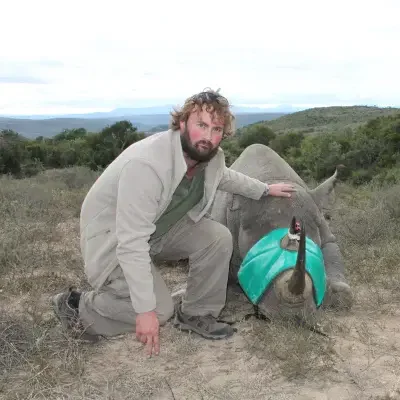About Rewilding UK
Dr Paul O’Donoghue - Director and Scientific Lead
Dr Paul O’Donoghue previously held the only protected species licence in the UK, to GPS collar and DNA Sample Scottish Wildcats. He was a scintific advisor for the highly successful Great Bustard Reotroduction in the UK and as also been an Expert Advisor and Co author for the IUCN Cat Classification Task Force.
Dr O’Donoghue has spent over 20 years dedicating his life to the conservation and protection of animals. A University of Oxford graduate in Biological Sciences, he then gained his PhD in Conservation Genetics at Sheffield University. His groundbreaking thesis produced a front cover research article, in the number one ranked, scientific journal in the world, ‘Nature’. An unprecedented accolade at the age of 25. Paul’s paper was the first time any scientist had shown the genetic erosion of fitness traits in wild populations, leading to over 770 subsequent paper citations and over 1500 international citations across his body of work.
He has also taken his passion and expertise into spearheading real-world, sector-leading projects, including the first person in the world to develop a real time anti-poaching system that can be successfully applied to any poached species such as rhinos. He also has extensive experience, translocating large mammals such as black rhinos and brown bears.
Paul’s work has garnered attention from high-profile and powerful individuals alike, from international Government ministers, to animal-activist and comedian Ricky Gervais. Through his work and in-depth expertise he has been featured by worldwide media organisations, including the New Scientist, National Geographic, the BBC, the Washington Post, as well as heading up the successful Channel 5 television series, The Elephant Hospital.
Paul’s academic prowess, ethical heart, and “get it done” attitude combined, mean he is perfectly placed to not only lead on large-scale animal and nature conservation projects, but also to effect real world change.
What is rewilding?
What does rewilding mean for the world?
Rewilding is about restoring nature on a large scale. It’s about bringing back the complexity of natural systems: habitats, ecological processes, and in some cases the reintroduction of species that have disappeared. RewildingUK envisions a future where rewilding takes place across the country, helping communities thrive, strengthening our connection with the natural world, and addressing the dual crises of biodiversity loss and climate change.
Rewilding is the process of restoring ecosystems to a state where nature can function independently again. This involves reviving natural processes and, where appropriate, reintroducing species that have been lost.
It offers more than conservation – it provides a pathway to renewal. Rewilding can revive wildlife populations, combat climate disruption, and benefit communities. It shifts the focus from simply protecting what remains to actively repairing and restoring what has been lost.
How rewilding can make a real world difference
Reverse Biodiversity Loss
Mitigate climate change
Offer the opportunity of rural regeneration
Improve health and wellbeing.


